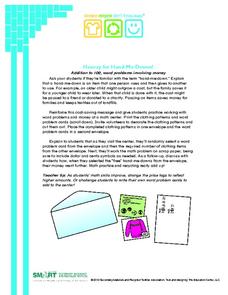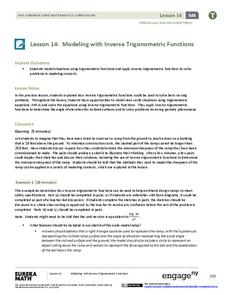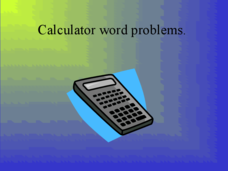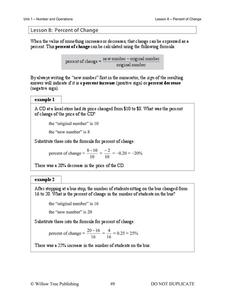Noyce Foundation
Rabbit Costumes
How many rabbit costumes can be made? This is the focus question of an activity that requires scholars to use multiplication and division of fractions to solve a real-world problem. They determine the amount of fabric necessary for eight...
Missouri Department of Elementary
Opportunity Knocks, But It Costs, Too!
Sixth graders practice six steps to effective problem solving. Working with the school counselor, class members are presented with a scenario that requires them to make a decision. Individuals then write a reflection in which they...
Curated OER
Hooray for Hand-Me-Downs!
Youngsters learn how "hand-me-downs" can help save money while practicing math word problems with this fun learning center activity.
Virginia Department of Education
Modeling Division of Fractions
Provide a meaningful context for learning about the division of fractions with this upper-elementary math lesson. Presented with a simple, real-world problem, young mathematicians work in small groups to develop visual models...
Curated OER
The 16 Habits of Mind
Study the 16 Habits of Mind with a professional resource. Based on Describing 16 Habits of Mind by Arthur L. Costa and Bena Kallick, the resource details 16 ways learners perceive problems around them and produce ways to deal...
CCSS Math Activities
Smarter Balanced Sample Items: 8th Grade Math – Claim 2
Math can be a problem in eighth grade. Sample items show how problem solving exists within the eighth grade standards. Part of the Gr. 8 Claim 2 - 4 Item Slide Shows series, the presentation contains eight items to illustrate the...
Illustrative Mathematics
What is 23 ÷ 5?
Twenty-three divided by five can have a different value depending on the unit of measurement being asked. Learners problem solve 23 divided by 5 in a series of five word problems.
EngageNY
Modeling with Inverse Trigonometric Functions 2
Use inverse trigonometric functions to work with ramps, rabbits, and Talladega. The class models real-world situations with trigonometric functions and solves them using inverses in the 15th installment of a 16-part series. Pupils solve...
EngageNY
Percent Increase and Decrease
Increase the percent of pupils that are fluent in solving change problems with an activity that asks class members to look at problems that involve either increases or decreases and to express the change in terms of the percent of...
Henry Ford Museum
You Can Be an Innovator ... Like Henry Ford
Why did Henry Ford want to invent a car for the masses? Why did Henry Ford locate his factory in Detroit? Why did Henry Ford encourage the idea of a 5-day work week? Young innovators find the answers to these and other question in a unit...
EngageNY
Applying Tangents
What does geometry have to do with depression? It's an angle of course! Learners apply the tangent ratio to problem solving questions by finding missing lengths. Problems include angles of elevation and angles of depression. Pupils make...
Computer Science Unplugged
Ice Roads–Steiner Trees
As an introduction to Steiner Trees, class members are challenged to find the shortest paths to connect multiple points. The teacher introduces the problem by showing how to connect three points. Groups then go outside and construct a...
EngageNY
Introduction to Simultaneous Equations
Create an understanding of solving problems that require more than one equation. The lesson plan introduces the concept of systems of linear equations by using a familiar situation of constant rate problems. Pupils compare the graphs of...
Missouri Department of Elementary
Listening Exercise
Active listening is key to interacting with others in a way that shows respect. To develop their skill as listeners, high schoolers first play the "Telephone Game" to demonstrate some of the problems that arise in communication. Pairs...
BW Walch
Creating and Graphing Linear Equations in Two Variables
This detailed presentation starts with a review of using key components to graph a line. It then quickly moves into new territory of taking these important parts and teasing them out of a word problem. Special care is...
Willow Tree
The Pythagorean Theorem
There isn't a more popular geometry formula than the Pythagorean Theorem! Learners understand the special side relationships in a right triangle. They use the Pythagorean Theorem to find missing sides and to solve problems. They begin...
California Education Partners
Improving Our Schools
Split the work three ways. Learners use their knowledge of fractions to solve problems dealing with splitting up work loads evenly between three groups. Scholars determine the fractional portion of work each group will do along with...
Curated OER
Section 2.5 - Problem Solving (Part B)
Trying to figure out the perimeter of a geometric figure? Here are a few word problems to set up algebraic equations to solve for perimeter. There are also some word problems to set up algebraic equations to solve for angles in a...
Curated OER
Calculator Word Problems
Eight word problems help learners to problem-solve using a calculator. They'll add, subtract, multiply, and divide to find each answer. Note: The problems are intended for a British audience so all monetary values are in pounds and...
Mrs. Burke's Math Page
The Amazing Pi Race
Add a sense of excitement to your math class with this race across the country. Using their knowledge of all things circular, young mathematicians work in pairs answering a series of pi-related word problems as they hop from one city to...
Willow Tree
Percent of Change
Your car decreases in value from $20,000 to $17,000. What percent of the value have you lost? Pupils answer word problems by determining the percent of change.
Willow Tree
Simple Probability
The probability of learning from this lesson is high! Learners calculate probabilities as numbers and as decimals. They see how to use a complement to find a probability and even try a simple geometric probability problem.
EngageNY
Probability Rules (part 2)
Ensure your pupils are rule followers! Learners add the addition rule to the set of probability rules examined in the previous lesson. Problems require both the multiplication and addition rule.
EngageNY
Finding One Hundred Percent Given Another Percent
Class members solve problems to find the whole when given a percent. They use double line numbers and factors of hundred to help break the 100 percent into equal segments.
Other popular searches
- Word Problems
- Multiplication Word Problems
- Math Word Problems
- Fraction Word Problems
- Multiplication Problems
- Division Word Problems
- Inequality Word Problems
- Addition Word Problems
- Elapsed Time Word Problems
- Math Story Problems
- Multi Step Word Problems
- Venn Diagram Math Problems























